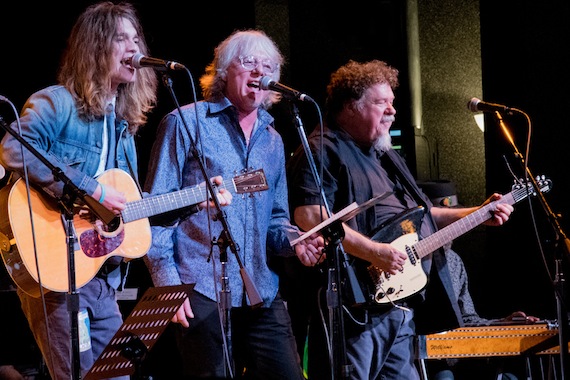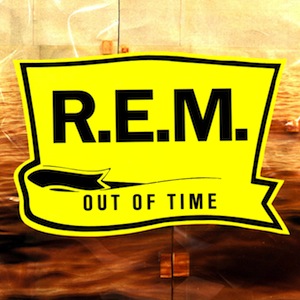

Pictured (L-R): Bertis Downs, R.E.M. Attorney; Craig Havighurst, Event Host; Mike Mills; Tom Truitt, WHO KNEW Founder/Music Row Search. Photo
One of the biggest pop bands to emerge from the South, R.E.M. impacted the world with the 1991 album Out of Time and the breakout single, “Losing My Religion.” To mark the 25th anniversary of the Grammy-winning project, founding member Mike Mills participated in the WHO KNEW series at Nashville’s City Winery on Oct. 7 to talk about one of the cornerstones of the alternative music movement. After that, Mills made a special appearance with Nashville cover band The Long Players in their full performance of the iconic album.
R.E.M. (composed of singer-songwriter Michael Stipe, lead guitarist Peter Buck, bassist Mills, and drummer Bill Berry) co-produced the album with Scott Litt. In 2011, the band announced it had broken up. Prior to taking the stage at City Winery, Mills visited at length with select press, including MusicRow about the Out of Time era. A portion of the interview is below.
MusicRow: I wanted to ask you about musical community, because you have Kate Pierson from The B-52’s singing on “Shiny Happy People,” and it seems like the Athens community is all about helping each other and lifting each other up. How important was having the community of musicians involved at that time?
Mike Mills: It was more important in retrospect than it was at the time, because within the little town of Athens there was the fraternity football crowd and then there was the 40 people who listened to the music that we listen to. Of those 40 people, 38 of them were in bands, and so we would all go see each other and dance at the shows, and have the parties afterwards. It was the sort of thing that you don’t know you’re in a scene when you’re in it, but when you look back later you see just how important everybody was to each other.
When the video for “Losing My Religion” hit, did you notice a major uptick in audiences and enthusiasm?
Yeah, “Losing My Religion” in itself changed everything, because once you have a big radio hit then you have people that get all the music from the radio. You don’t have the fans who go and search out for music. It’s grandmothers who start buying the record to give to their grandkids. When you enter that realm that’s the mega-world where you sell 10 million records or whatever, and that’s where everything changes.
That’s OK though, that it hit that realm.
It’s great and the best thing about it was that it enabled us to play anywhere in the world, which was fun for us. It’s what we wanted to do. It’s why we signed with Warner Bros. Records, to be able to play more in Europe and get bigger crowds in Europe. No reflection on [former label] I.R.S. It just didn’t have the overseas thing going on.
We went to Israel to do press and we were talking to the DJ at this club and he says, “The kids want to hear ‘Oh Life.’” It’s the only words [from “Losing My Religion”] they can understand, so they come up and say, “Play, ‘Oh Life.’” OK, that works. Once you get into that sort of penetration of the world, then different things happen.
While we’re talking about “Losing My Religion,” I’m sure you got asked a million times back then, “What is the song about?” At that time, how did you explain the song to people who were curious about the message?
I didn’t have to. The thing about Michael’s songs, I very seldom ever asked him what they were about, because even if I didn’t know what he meant they gave me an image. I had a feeling or a thought about it and that’s all I needed. I didn’t need to know exactly what he meant and “Losing My Religion” was pretty clear to me—that it was talking about obsession and unrequited love.

Pictured (L-R): Robin Zander Jr.; Mike Mills; Bill Lloyd of The Long Players
One thing I remember about that era of music is that most bands would never consider licensing their songs to a commercial. Now it’s like the dream for a lot of bands.
It’s the only way to get your music career out, because radio is so fragmented and satellite radio is also pretty specific for whatever channel you’re listening to. If you don’t fit that format you’re not on that channel, so I won’t blame bands now. It used to really piss me off but now I just shrug. It’s just the nature of the world now.
There used to be a stigma attached to it. Of course in my mind there still is but I can’t sit there and tell a young man, “You’re losing your integrity by putting that song on a beer commercial,” because they want to play. They want to get out there and sell records and make a living of this, and if that’s how you do it now, then that’s how you do it.
Have you been approached to license your songs for the commercials?
Yeah.
Is it always going to be a no?
Always going to be a no. Movies and television are different, because they’re art forms and they’re forms that we love and we grew up enjoying. The Standells were on The Munsters, Boyce & Hart were on Bewitched, Alice Cooper was in the movie Diary of a Mad Housewife. As a kid when you’re watching TV, that may be your only exposure to these really cool bands, and there’s no loss of integrity by doing that. It’s just another medium. You’re really not selling anything by doing that. It’s just a cool combination of two different media.
 Are you surprised at all about how big Out of Time became?
Are you surprised at all about how big Out of Time became?
Yeah, every record up to that including the next one sold more than the one before it, so we just felt comfortable with that kind of growth. You get used to it. You say, “Well, that one sold X, this one will sell X plus Y,” and we were lucky enough to be right for that. When Out Of Time hit so big, it wasn’t a big shock. We were surprised “Losing My Religion” was the song that did it. Nobody expected that. The record company didn’t expect it. That was the lead-in. That was the warm up song to “Shiny Happy People,” so instead it became the big hit which is great, because I’d much rather that be the hit than “Shiny Happy People.”
Why do you think that is?
It’s so much about the time. Our growth and our emergence into the world and people’s consciousness had grown and grown and grown—and it’s a great song. It’s a great record, it sounds great. It doesn’t have all the criteria you would tick off to have a hit single, which is even better. For whatever reason it was the right song by the right band at the right time, and it exploded. It’s rewarding to know that people around the world know a good song when they hear it. There’s nothing gimmicky about it. They just love the song and as a result they want to hear it more.



